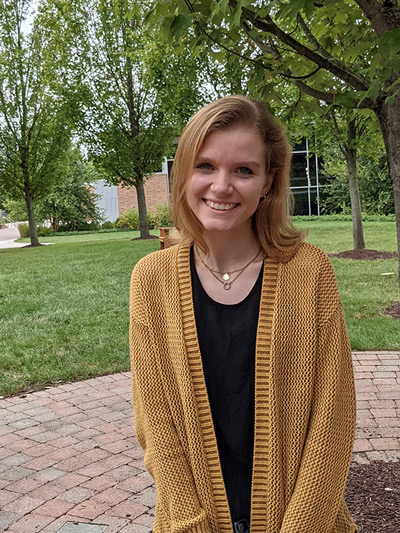Tuesday, May 17, 2022
Category: Students
From labs to poetry readings
By April Hooper ’22

Courtney Smith ’22 found herself at a loss when she first entered college. A self-proclaimed “jack of all trades but master of none,” no single major felt right to her. She had an interest in both science and the arts but decided to begin her college journey as a biochemistry major. However, she soon lost touch with her creative side. As a way to reconnect with her love of reading and writing, she added a second major: English.
This unique combination of majors did not deter Smith because she wasn’t focused on finding two majors that were traditionally paired together. Rather, she found joy in each individually. She enjoyed her science classes but also wanted to “explore this haven of literature created by the [English] department.”
On the surface it may seem like biochemistry and English have nothing in common. At first, Smith agreed. “It really wasn’t until I started classes that I found that they truly do complement each other well,” she said. A writer at heart, she understood the importance of communication skills in every discipline. As time went on, the clearer that connection became. “You have to be capable of communicating the information or ideas that you discover to an audience because no discipline exists in a vacuum,” she said.
The closer she looked, the more crossover she saw between seemingly opposite areas of study. “My scientific background has equipped me to be analytical and detail-oriented in my writing,” she said, “and my English background has taught me to look at an experiment through multiple, creative lenses, particularly to see the human side of every project.”
As she slowly blurred the lines between science and the humanities, she realized the liberating possibilities of an interdisciplinary approach that changed her education for the better. “I appreciate this overlap in general as I have learned to transfer skills across disciplines,” she said, “and approach my academics in a more holistic and creative manner.”
Smith is one of the few students to have a double major spanning across science and the humanities. She considers the rarity of this a detriment because, as she says, “we have it ingrained in our minds that the disciplines are opposites, that they occupy different, isolated parts of our brain and that we are always more skilled in one area than the other. The truth is far less black and white.” She encourages all students not to let a stereotype or lack of confidence hold them back.
Ultimately, this interdisciplinary experience enhanced Smith’s education as she learned to ask new questions and make deeper connections. “Being interdisciplinary brings so much diversity to academics, and it opens up conversations that we couldn’t or wouldn’t think to have otherwise,” she said. Uniting these disciplines gave Smith the space to “become a more well-rounded student, person and scientist.” In the fall, she will attend Penn State’s Ph.D. program in biochemistry, microbiology and molecular biology.